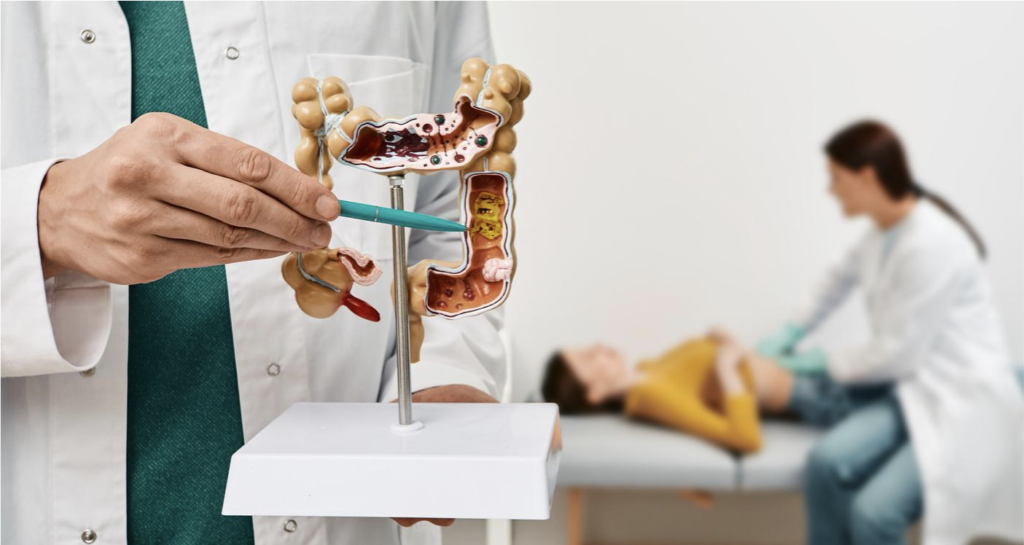
For most of us, a visit to the doctor means going to your primary or general physician for a regular check-up. However, some medical conditions and warning signs, such as those involving the gastrointestinal system (GI), require more specialized diagnosis and care. You cannot overlook the significance of the gastrointestinal or gut system to your body’s overall health as it is home to your immune system. It comprises various crucial body organs, including the mouth, pharynx, esophagus, stomach, small intestine, large intestine, and the biliary system, which comprises the gallbladder, liver, bile ducts, rectum, pancreas, and anus. Because of all these parts, the gastrointestinal system can be a source of many conditions that necessitate specialized healthcare with a gastroenterologist or a gastrointestinal specialist.
What Does a Gastrointestinal Specialist Do?
A gastroenterologist or gastrointestinal is a certified and licensed medical specialist who primarily diagnoses and treats GI conditions. These specialists work together with your primary physician. If the physician notices any issues involving your GI system, they’ll refer you to a gastrointestinal specialist for a more detailed and specialized diagnosis and treatment.
Once there, the GI doctor will perform endoscopic procedures using specialized equipment to view and diagnose your gut. Although GI specialists don’t perform surgery, they may work with GI surgeons for more severe cases requiring surgery.
A GI doctor/specialist diagnoses and treats conditions like:
-
- Cancers of the GI system, including colorectal, liver, pancreatic, colon, and gastrointestinal cancer.
- Hemorrhoids and bloody stool.
- Celiac disease
- Diseases of the gallbladder.
- Pancreatitis.
- Acid reflux.
- Gastroesophageal Reflux Disease (GERD).
- Crohn’s disease.
- Ulcerative colitis.
- Polyps in the GI tract.
- Irritable Bowel Syndrome (IBS).
- Rectal bleeding.
Signs You May Need to See a Gastroenterologist
While you can identify some of the above conditions, such as a bloody stool on your own, some signs might tell you it’s time to visit the doctor.
1. Frequent Abdominal Pain
You can experience abdominal pain, discomfort, and bloating after overeating or taking something that disagrees with your stomach. For instance, you might feel irritable if you take excessive milk, if you are lactose intolerant. Such random and irregular abdominal pains are nothing to worry about.
But, frequent and prolonged abdominal or stomach pain may be signs of a serious issue. It’s advisable to see a GI specialist if you experience abdominal pains frequently to avoid further complications. Such pains could be caused by stress, sensitivity to certain diets, or medical conditions and diseases like Crohn’s disease, ulcerative colitis, ulcers, or small intestine bacterial overgrowth (SIBO).
2. Frequent Heartburn
Most people don’t consider heartburn as a major gastrointestinal problem with the assumption that it’s just mere indigestion that causes a burning feeling in your chest. Others assume that it’s just a sign of aging. That’s entirely false.
Heartburn occurs when acid from your stomach backs up in the esophagus. That’s why you feel the burning sensation in your chest. Troublesome symptoms and / or complications as a result of acid reflux is known as GERD or gastroesophageal reflux disease. Besides heartburn, other symptoms include a bitter taste in your mouth and chest pain after a meal or while laying down. Complications of GERD can include esophagitis, esophageal scarring and rarely, esophageal cancer.
Almost everyone experiences heartburn once in a while. Over-the-counter medications can help alleviate heartburn. However, frequent or prolonged heartburn require you to visit a GI specialist for a detailed diagnosis and examination of your upper GI tract and come up with a treatment plan.
3. Rectal Bleeding
If you find blood in your stool or tissue paper, it might signify that you have an issue somewhere within your GI system. Some common causes of rectal bleeding include anal fissures, polyps in the large intestine, hemorrhoids, irritable bowel syndrome (IBS), Crohn’s disease, and ulcerative colitis. In worse cases, rectal bleeding could point to colon or rectal cancer.
You are likely to experience rectal bleeding accompanied by some inflammation due to strained bowel movements, constipation, and chronic diarrhea. These can get severe and even interfere with normal bowel functioning. While there are some over-the-counter medications and home remedies that can help deal with rectal bleeding and ease the pain, it’s advisable to see a GI doctor if the bleeding and inflammation persist.
4. Abnormal Bowel Movements
The typical bowel movements range from three times a day to three times a week. If you have less than three bowel movements a week, it means you have constipation. Conversely, anything more than three or more bowel movements a day is termed diarrhea. Constipation and diarrhea are both abnormal bowel movements.
Irregular or abnormal bowel movements are direct indications of issues with your GI tract. You could be having blockage, obstruction, lactose intolerance, or other severe conditions like Crohn’s disease or IBS. Subtle cases could be due to your body reacting to some food or medication.
Any changes, especially sudden ones, in your bowel habits may require you to visit a GI specialist.
5. Difficulty Swallowing
Frequent pain and difficulty swallowing could be signs of issues with your GI tract. They may point to serious conditions like GERD and esophageal cancer. Also, a lump in your throat coupled with signs such as congestion, cough, and runny nose could mean that you have issues within your GI system. In that case, visit a GI specialist who will examine your GI tract using an endoscope and recommend a treatment plan.
Schedule a Consultation With a Gastroenterologist Today
Your GI system is critical to your health as some of the body’s vital organs are found there. Thus, it’s advisable to consult a gastroenterologist if you notice any changes in your bowel habits, rectal bleeding, or blood in your stool. Frequent heartburns and abdominal pains also mean that you have issues with your GI tract, and it’s time to visit a reliable specialist.
At Shore Gastroenterology Associates, we care about your gastrointestinal wellbeing. We offer a range of cutting-edge treatments for various gastrointestinal conditions and diseases to give you the diagnosis and relief you deserve. Our team of highly skilled gastroenterologists is always ready to give you the best care and get your health back as soon as possible.
Please don’t hesitate to contact us today for inquiries or schedule a consultation with one of our gastroenterologists today.
© All Rights Reserved


